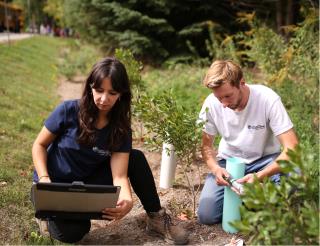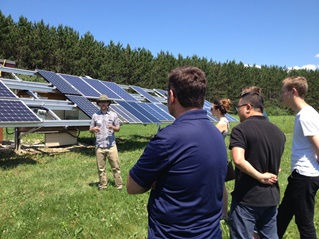About STEP
The Sustainable Technologies Evaluation Program (STEP) is a multi-agency initiative developed to support broader implementation of sustainable technologies and practices within a Canadian context. STEP works to achieve this overarching objective by:
- Carrying out research, monitoring and evaluation of clean water and low carbon technologies;
- Assessing technology implementation barriers and opportunities;
- Developing supporting tools, guidelines and policies;
- Delivering education and training programs;
- Advocating for effective sustainable technologies; and
- Collaborating with academic and industry partners through our Living Labs and other initiatives.
Technologies evaluated under STEP are not limited to physical devices or products; they may also include preventative measures, implementation protocols, alternative urban site designs, and other innovative practices that help create more sustainable and liveable communities.
STEP also acts as a third party verifier for the Environmental Technology Verification (ETV) process. ETV provides independent evaluation of new technologies in order to validate environmental claims so that users, developers, regulators, and other parties can make informed decisions about purchasing, applying and regulating innovative technologies.
STEP Water
 The water component of STEP is a partnership between Toronto and Region Conservation Authority (TRCA), Credit Valley Conservation and Lake Simcoe Region Conservation Authority. The key focus areas are:
The water component of STEP is a partnership between Toronto and Region Conservation Authority (TRCA), Credit Valley Conservation and Lake Simcoe Region Conservation Authority. The key focus areas are:
- Urban Runoff and Low Impact Development;
- Erosion and Sediment Control;
- Healthy Soils;
- Salt Management; and
- Protection of Natural Features and Systems.
STEP Water funding partners include:
- Toronto and Region RAP
- City of Toronto
- Region of Peel
- Region of York
- Ontario Ministry of the Environment and Climate Change
- Environment and Climate Change Canada
In addition to our program partners, STEP has worked with over 100 project specific partners in both the private and public sectors, all of whom are acknowledged on the project webpages.
The mandate and organizational structure for the water component builds upon experiences from the Stormwater Assessment Monitoring and Performance (SWAMP) program and feedback from various agency and industry representatives. The SWAMP program was focused on studies of conveyance and end-of-pipe facilities such as perforated pipe systems, ponds, constructed wetlands, flow balancing systems, detention tanks and hydrodynamic separators. Click here to learn more about the SWAMP program.
STEP Energy
 The energy component of STEP is led by the TRCA, and is focused on projects in the areas of:
The energy component of STEP is led by the TRCA, and is focused on projects in the areas of:
STEP Energy funding partners include or have included:
- Independent Electricity System Operator
- Natural Resources Canada
- LDC Tomorrow Fund
- Region of York
- Region of Peel
- City of Toronto
- The Atmospheric Fund
In addition to our program partners, STEP has worked with over 100 project specific partners in both the private and public sectors, all of whom are acknowledged on the project webpages.



